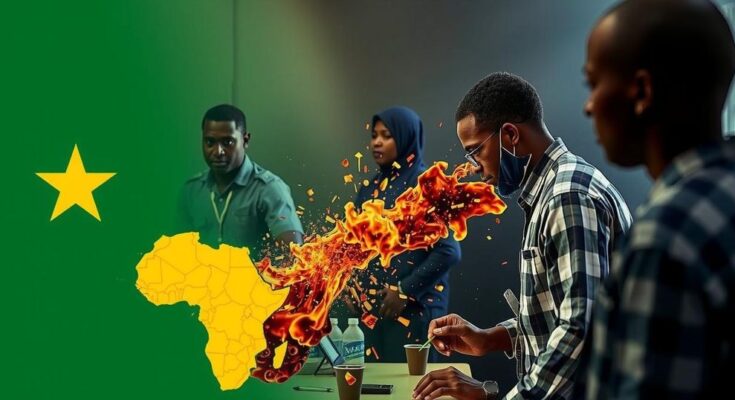Namibia is currently facing electoral chaos due to the extension of voting amid reported irregularities, including logistical failures and long voter queues. The IPC seeks to capitalize on the situation to challenge Swapo’s decades-long dominance. The youth are particularly frustrated by economic disparities, as they await a resolution to the election process.
Namibia has recently experienced significant election turmoil following an extension of voting for the presidential and parliamentary elections due to reported irregularities. The Electoral Commission of Namibia (ECN) announced that polling stations, which were originally scheduled to close two days prior, would remain operational until Saturday night. This decision was necessitated by logistical failures, such as insufficient ballot papers and malfunctioning electronic voter registration tablets, resulting in long wait times for voters.
Opposition parties, particularly the Independent Patriots for Change (IPC), are leveraging this situation to challenge the ruling South West Africa People’s Organisation (Swapo), which has governed since Namibia’s independence in 1990. IPC’s presidential candidate, Panduleni Itula, expressed frustration regarding the electoral irregularities while urging citizens to fulfill their civic duties by voting despite the chaos. He is currently competing against Swapo’s vice president, Netumbo Nandi-Ndaitwah, who could become Namibia’s first female president.
Frustration is palpable among voters, like Nangombe Shitaleni, who has repeatedly attempted to cast his vote without success. This highlights the growing discontent among Namibia’s youth, who are seeking more opportunities amidst the country’s high inequality, despite being classified as an upper-middle-income nation by the World Bank. The situation in Namibia draws attention to ongoing unrest in Mozambique, where the ruling party’s election results have been met with claims of rigging and subsequent protests.
Namibia, previously a German colony and later administered by South Africa, gained independence in 1990 following a prolonged liberation struggle led by Swapo. Since its independence, Swapo has maintained a firm grip on power, but recent electoral challenges indicate potential shifts in voter sentiment. A youthful population plagued with economic disparity is beginning to push back against the ruling party. As seen in other Southern African nations, established political parties that once led liberation movements have recently faced rejection at the polls, raising questions about Swapo’s stability given the current electoral unrest.
In conclusion, Namibia’s recent election challenges, marked by extended voting due to irregularities, signal a growing dissatisfaction among the electorate, particularly the youth. The opposition IPC seeks to capitalize on this discontent to potentially dethrone Swapo’s long-standing rule. The unfolding events in Namibia not only reflect internal political dynamics but also resonate with similar electoral trends observed in neighboring Southern African countries, where the legacy of liberation movements is increasingly questioned by voters.
Original Source: www.aljazeera.com




